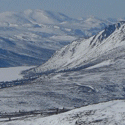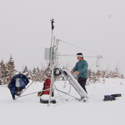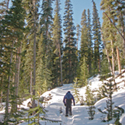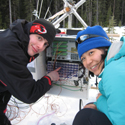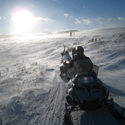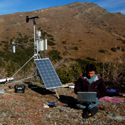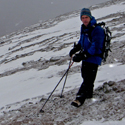|
IP3
and IPY - The International Polar Year 2007-8
The International Polar Year is
a major scientific programme focused on the Arctic and the Antarctic; the
majority of activities were in progress between March 2007 and March 2009, but
many others have continued since this interval.
Organized through the International Council for Science (ICSU) and the World
Meteorological Organization (WMO), this is actually the fourth polar year,
following those in 1882-3, 1932-3, and 1957-8.
In order to have full and equal coverage of both the Arctic and the Antarctic, IPY 2007-8 covered two full annual cycles, from March 2007 to March 2009, and involved over 200 projects, with thousands of scientists from over 60 nations examining a wide range of physical, biological and social research topics. It
provided an unprecedented opportunity to demonstrate, follow, and get involved
with, cutting edge polar science in real-time.
The Canadian International Polar Year Committee has funded a project on Arctic ecology and hydrology led by Fred Wrona and Al Pietroniro. Theme 1 of this combined project, Cycling and Prediction of Freshwater in the Arctic, is led by IP3 Project Leader John Pomeroy and complements and augments the goals of IP3. Theme 1 aims to investigate the importance of water to Canadian polar regions and how availability of water may change in the future. These goals will be achieved via field observations in polar locations which are currently instrumented (existing long-term monitoring locations) as well as remote locations which have limited or no observational capabilities. Modelling studies will complement the field observations and aid in interpretation of the collected data.
The major objective is a comprehensive assessment of the current state of Canadian polar freshwater, including water in the Arctic islands. This work will provide insights into snow, rain, runoff, evaporation, and change in water storage in key polar environments during IPY and afterwards. Another result of the field campaigns, data assimilation, and process studies will be improved understanding of changes in the hydrologic cycle, including changes in snow cover, runoff, wetlands, and perennial snow patches. The expected advances from this study will benefit Canadian communities throughout the Arctic as well as scientific, commercial, and other operations in the region.
More information:
The following links provide additional information about Canadian
involvement in IPY 2007-8
-
Principal IPY Website
- Monthly Reports
- Arctic Portal
- Government of Canada
-
Indian & Northern Affairs Canada
- Canadian Polar Commission
- Environment Canada
- Canadian IPY Early Results Workshop
- Canadian IPY Outreach & Education
- Canadian Geographic article - What is IPY?
IPY Project Theme 1;
List of Investigators and Collaborators
|










